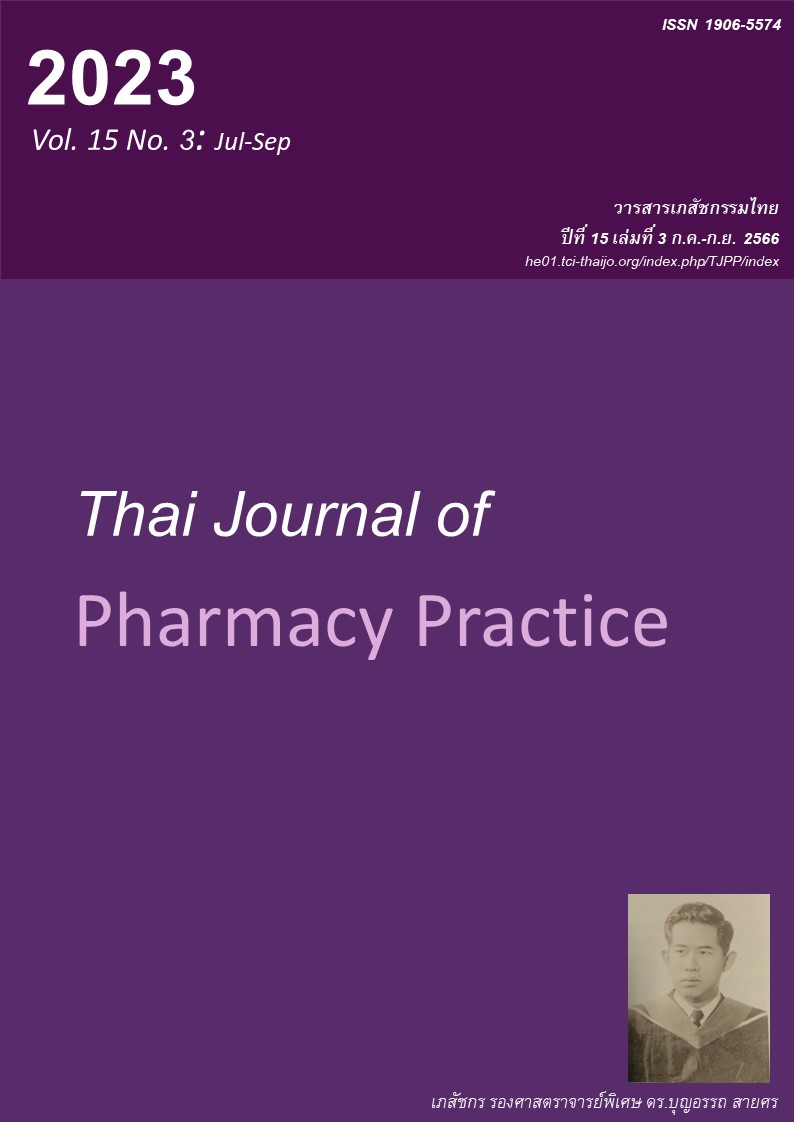ผลของการอบรมและการนิเทศต่อคุณภาพการบริหารคลังยาของโรงพยาบาลส่งเสริมสุขภาพตำบล
Main Article Content
บทคัดย่อ
วัตถุประสงค์: เพื่อศึกษาถึงผลของการอบรมและการนิเทศต่อการเพิ่มคุณภาพของการบริหารคลังยาในโรงพยาบาลส่งเสริมสุขภาพตำบล (รพสต.) ใน 4 จังหวัดทางภาคใต้ วิธีการ: การวิจัยเป็นแบบการทดลองแบบสุ่มที่มีกลุ่มควบคุม ตัวอย่าง คือ รพ.สต. 63 แห่งใน 4 จังหวัดทางภาคใต้ ได้แก่ สตูล กระบี่ ปัตตานี และนครศรีธรรมราช ตัวอย่างถูกจับฉลากสุ่มแยกเป็นกลุ่มควบคุม (N=30) และกลุ่มทดลอง (N=33) กลุ่มทดลองได้รับการแทรกแซง คือ 1) การอบรมจากเภสัชกรเรื่องการบริหารเวชภัณฑ์ที่ดีและการนำบัญชีควบคุมเวชภัณฑ์มาใช้ และ 2) การนิเทศติดตามและช่วยแก้ปัญหาโดยเภสัชกร จำนวน 2-3 ครั้งหลังการอบร 16-45 วัน หรือ 60 วัน หรือ 90 วันหรือ 135 วันขึ้นกับการตกลงกันภายในจังหวัด ผู้วิจัยประเมินคุณภาพของการบริหารเวชภัณฑ์ใน 10 ด้าน (ด้านละ 1 คะแนน รวมคะแนนเต็ม 10) จำนวน 3 ครั้ง คือ ครั้งที่ 1 ก่อนการอบรม ครั้งที่ 2 หลังการอบรม 30 หรือ 60 วัน หรือ 90 วันขึ้นกับการตกลงกันภายในจังหวัด และครั้งที่ 3 หลังการอบรม 90 วันหรือ 180 วันขึ้นกับการตกลงกันภายในจังหวัด การประเมินทำโดยการสังเกตคลังยา การสัมภาษณ์ผู้ปฏิบัติงาน และการตรวจสอบเอกสาร ผลการวิจัย: ก่อนการแทรกแซง กลุ่มควบคุมและกลุ่มทดลองมีคะแนนการประเมินคุณภาพไม่แตกต่างกันอย่างมีนัยสำคัญทางสถิติ (P>0.05) (2.84±0.39, N=30 และ 3.17±0.38, N=33 จากคะแนนเต็ม 10 ตามลำดับ) การประเมินหลังการแทรกแซง 30-60 วัน พบว่า กลุ่มทดลอง (7.74±0.46, N=13) มีคะแนนมากกว่ากลุ่มควบคุม (2.96±0.48, N=12) อย่างมีนัยสำคัญทางสถิติ (P<0.001) การประเมินหลังการแทรกแซง 90 วัน พบว่า กลุ่มทดลอง (8.03±0.44, N=33) มีคะแนนมากกว่ากลุ่มควบคุม (3.58±0.47, N=30) อย่างมีนัยสำคัญทางสถิติ (P<0.001) ส่วนการประเมินครั้งที่สาม พบว่า กลุ่มทดลอง (8.47±0.64, N=20) มีคะแนนมากกว่ากลุ่มควบคุม (4.89±0.65, N=18) อย่างมีนัยสำคัญทางสถิติ (P<0.001) สรุป: การแก้ไขปัญหาการบริหารคลังยาใน รพ.สต. สามารถทำได้โดยใช้การอบรมให้ความรู้และการนิเทศติดตามที่มีการให้ข้อมูลย้อนกลับ ผู้เกี่ยวข้องสามารถประยุกต์ใช้วิธีการนี้เพื่อแก้ไขปัญหา
Article Details

อนุญาตภายใต้เงื่อนไข Creative Commons Attribution-NonCommercial-NoDerivatives 4.0 International License.
ผลการวิจัยและความคิดเห็นที่ปรากฏในบทความถือเป็นความคิดเห็นและอยู่ในความรับผิดชอบของผู้นิพนธ์ มิใช่ความเห็นหรือความรับผิดชอบของกองบรรณาธิการ หรือคณะเภสัชศาสตร์ มหาวิทยาลัยสงขลานครินทร์ ทั้งนี้ไม่รวมความผิดพลาดอันเกิดจากการพิมพ์ บทความที่ได้รับการเผยแพร่โดยวารสารเภสัชกรรมไทยถือเป็นสิทธิ์ของวารสารฯ
เอกสารอ้างอิง
Strategy and Planning Division, Office of the Permanent Secretary, Ministry of Public Health. Report on public health resources in 2021 [online]. 2021 [cited Jul 18, 2022]. Available from: bps.moph. go.th/new_bps/sites/default/files/Report%20Health%20Resource%202021.pdf
National Health Security Office. A guide for pharma- cists in providing pharmacy services in primary care units. Bangkok: Sri Muang Printing; 2017.
Bureau of Primary Health System Support, Ministry of Public Health. Handbook on guidelines for the development of quality sub-district health promoting hospitals in 2021 [online]. 2021 [cited Oct 7, 2022]. Available from: drive.google.com/file/d/1aCDXtrAjIY PlD gn403Jz-d_6fEWp4U3J/view.
Makepiboon P. Efficacy of vendor managed inventory system in drug inventory management in sub-district health promoting hospital Laemsing District, Chanta buri Province [master thesis]. Nakhon Prathom: Silapakorn University; 2021.
Kitikannakorn N, Duangchan S. Ability in medical supply inventory management of primary care units (PCUs). Buddhachinaraj Medical Journal 2012; 29: 27-35.
Intuyot N, Kessomboon N. Improving the inventory management system using modified vendor managed inventory: a case study of primary care units in Klonglan District, Kampaengpetch. Journal of Health System Research 2013; 7: 241-51.
Srilamart S, Bouphan D. Drug management of health personnel at sub-district health promoting hospitals in Khon Kaen Province. Khon Kaen University Journal 2013; 13: 121-32.
Chommongkol W. Developing standard qualities of health centers in Amphoe Na Wa, Changwat Nakhon Phanom [master thesis]. Mahasarakam: Mahasarakam University; 2007.
Fungsuk N, Ponnok A. Development of efficient medicine inventory management of the health promoting hospital, Uthai District, Phranakorn Sri Ayutthaya Province. HCU Journal 2017; 21: 109-22.
Trap B, Lessing C, Laver S. The essential drugs training programme in Zimbabwe 1987 to 1995, development, implementation and evaluation. In: Chaudhury RR, editor. International experiences in rational use of drugs. Volume II. Bangkok: Chulalongkorn University; 1996.
Soumerai SB, Mclaughlin TJ, Avorn J. Improving drug prescribing in primary care: a critical analysis of the experimental literature. Milbank Q 1989 67: 268–317.
Loevinsohn BP, Guerrero ET, Gregorio SP. Improving primary health care through systematic supervision: a controlled field trial. Health Policy Plan 1995 10: 144–53.
Trap B, Todd CH, Moore H, Laing R. The impact of supervision on stock management and adherence to treatment guidelines: a randomized controlled trial. Health Policy Plan. 2001;16: 273-80. doi: 10.1093/heapol/16.3.273.
Praprukdee M. Development of a medical supplies management system in Tambon health promoting hospitals of Phra Phrom District, Nakhon Si Thamma rat. Journal of Health Sciences and Pedagogy 2021; 1: 16-29.
Siha W, Aphasrithongsakun S. Development of medical supplies system in health promotion hospitals from Kamalasai hospital by applying vendor managed inventory. Research and Develop ment Health System Journal 2020; 13: 670-82.
Faul F, Erdfelder E, Buchner A, Lang AG. Statistical power analyses using G*Power 3.1: Tests for correlation and regression analyses. Behav Res Methods 2009; 41: 1149-60.
Cohen J. Statistical power analysis for the behavioral sciences. New York: Academic Press; 1969.


